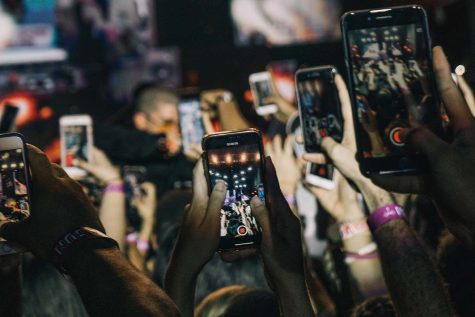Our smartphones are harming us, right? Nope! You control how much power your phone has over you
July 28, 2022

Editor’s note: This article is from the Communication Department’s award-winning Echo magazine.
If you Google anything about the impact smartphones have had on Gen Z, you get a sea of search results that consist of researchers and mommy bloggers shaming parents for exposing their children to the blue light of death. It sounds like screens are bad.
However, this isn’t entirely true. Carolyn Moriarty, a clinical professional counselor at the Chicago Counseling Center, believes that screen time and the apps we choose to spend it on are “inherently neutral.”
“It’s what we choose to consume that has a positive or negative impact on our mental health,” Moriarty says. “We have to be mindful of what content might be triggering, including platforms that encourage self-comparison, like Instagram.”
Kathryn Wozniak, an adjunct associate professor in the master’s program for computer science at the University of Chicago, does not deny the negatives of screen time, but also acknowledges that smart phones aren’t inherently evil.
“Yes, there is a dark side to using technology,” Wozniak says. “But we don’t have to be victims of its negative effects. We have a choice.”
Sometimes it can even seem like controlling your screen time is impossible, but Wozniak says the conditions don’t determine the outcome.
“Since many of us have to use technology to do our jobs, it is impractical to say that screen time should be limited to X hours,” Wozniak says. “However, I do believe that our body and minds will tell us when we’ve had too much.”
Gretel Hoffmeyer, a 24-year-old healthcare worker, realized she had hit her limit when she started to notice her personality shifting as she was spending more time on social media at the start of the pandemic, so she deleted all of her accounts.
“I’ve always been the type of person who would feel so happy for other people accomplishing their goals and doing fun things,” Hoffmeyer says. “All of a sudden, I felt just so much envy with other people and felt like, ‘Oh, since they’re doing so much, I’m jealous of them. I’m not doing enough.’”
Anyone who is exposed to technology for hours at a time is at risk to experience negative side effects. For Moriarty, the key to keeping your head above water is being responsible with your tech consumption.
“If you are isolating yourself or feeling generally unmotivated to do anything else except interact with technology, that is a sign that it’s time for a break,” she says.
Taking a break can look like going for walks outside, reading a book or the 20-20-20 technique, which Wozniak recommends. “For every 20 minutes of screen time, I look 20 feet away from the screen for 20 seconds,” she says.
Is your phone really that bad for you? No, not really. Like anything else, constant and consistent use of technology can cause problems in some people’s lives. But getting your hands on the newest Samsung Galaxy won’t condemn you to a lifetime of tech addiction — if you don’t let it.
You can read the entire 2022 issue of Echo, as well as previous issues, on our website.







